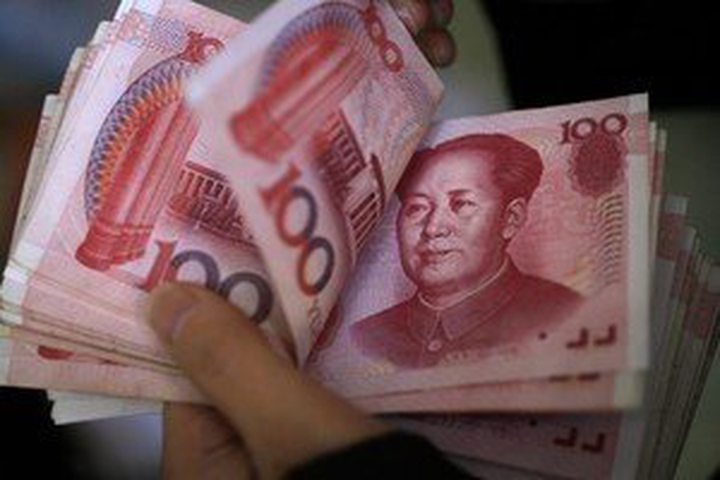Trillion Yuan Fled China Banks. You Won't Believe Where It Went

What is the explanation for the sudden loss of deposits? There was, from some indications, substantial capital flight from China this month, but the movement of funds out of the banking system does not appear directly connected to the shifting of money overseas. If it were, state media would not have highlighted the phenomenon. After all, Beijing in recent weeks has downplayed the movement of capital leaving the country, as is clear from the announcement last Monday by the State Administration of Foreign Exchange.
The reason for the loss of deposits is, at least in one sense, even worse than capital flight. Banks, employing various stratagems, have been booking deposits at the end of calendar quarters to meet loan-to-deposit ratio and other requirements. For instance, these financial institutions routinely borrow at quarter-end and record the proceeds as deposits. This trick, aided by clever accounting, explains why banks at the end of reporting periods can show large cash positions and yet still not have the funds to make loans, as happened last month.
Another technique to meet regulatory requirements involves WMPs, the infamous wealth management products offering abnormally high rates of return. The banks make sure these products mature at the end of quarters so they can show cash as deposits. When new quarters begin, the banks roll over the WMPs and the process starts again. As Anne Stevenson-Yang of J Capital Research in Beijing points out, this time “someone thought to check post June 30.” Therefore, we saw the rush of deposits out of the banks in the first week of this month as cash was rolled, once again, into unstable WMPs.
There are two principal consequences to these and other quarter-end maneuvers. First, the banks obviously do not have the deposit base they need for the safe conduct of business. The People’s Bank of China , the central bank, and the China Banking Regulatory Commission know what is going on, but they are powerless to stop the games. If they actually cracked down, they would be forced to close the country’s banks, both large and small, and that is one thing they cannot do. In the absence of effective regulation, therefore, they leak stories to the Shanghai Securities News.
Second, the roundtripping of funds can be continued for some time to keep the banks afloat. In fact, banks have been using these techniques—and a multitude of others far more sophisticated—for decades. Chinese banks, however, know they need to raise funds in the short term to maintain capital adequacy ratios. ChinaScope Financial, a research firm, estimates their capital needs for this purpose at between $5 billion to $10 billion during the next two years.
China Merchants Bank , China’s sixth-largest lender by assets, said on Tuesday that it would issue 3.07 billion new A-shares, and other institutions will want to follow suit. Yet it’s not clear that investors will be as willing to commit funds as they have in the past. Punters in Shanghai and Hong Kong sent the bank’s stock lower on the announcement, which had been expected, and the stocks of smaller banks were also hurt. Because of the long lag times for offerings, unfavorable market conditions, and bad news about the sector, there may be no new bank offerings this year.
In the meantime, the banking system will have to attract fresh deposits. That, as a practical matter, will be difficult because the State Council does not have much flexibility to raise deposit rates and, as a practical matter, it is not in a position to scrap the deposit-rate cap altogether.
Low bank rates means that risky wealth management products will continue to suck more money into their maw. That, incredibly, is already happening. Thursday, Fitch Ratings reported that in the second quarter of this year Chinese money-market funds lost “about 45%” of their assets. Institutional funds were particularly hard-hit. They lost “nearly 50%.” About 25% of these funds lost “more than half of their asset base.” As a result, funds catering to the retail market now have more assets than institutional ones.
The drop in money-market fund assets is bad news for the banks. Money-market funds typically put a portion of their assets into bank deposits, so redemptions hit the banks as the funds have to withdraw deposits to pay back fleeing investors. Fitch said that some of the redemptions were made for technical reasons—investors feared future limits on withdrawals, for instance—and that a portion of the withdrawn funds were going into the banks directly, but it gave another explanation that made much more sense: redeemed money was chasing higher yields in WMPs.
Of course, money-market funds are among the safest investments in China as they put their assets to work in short-term instruments like government obligations and central bank bills. In other words, the massive Q2 redemptions tell us that there now exists strong reasons for Chinese investors to ditch some of the most prudent investments in their country for the most risky.
This means, at the very least, that there is something fundamentally wrong with the structure of incentives in the Chinese financial system.





